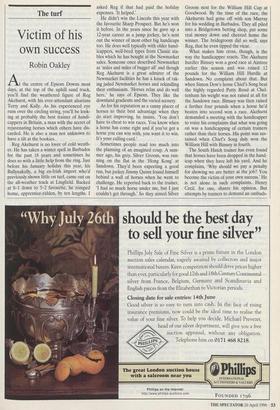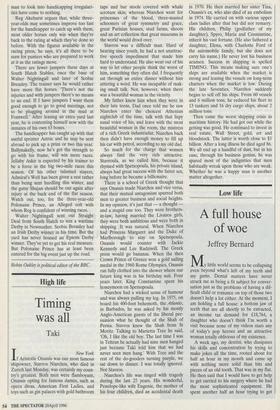The turf
Victim of his own success
Robin Oakley
At the centre of Epsom Downs most days, at the top of the uphill sand track, you'll find the weathered figure of Reg Akehurst, with his ever-attendant alsatians Terry and Kally. As his experienced eye runs over the circling string, you'll be look- ing at probably the best trainer of handi- cappers in Britain, a man with the secret of rejuvenating horses which others have dis- carded. He is also a man not unknown to have a tilt at the bookies.
Reg Akehurst is no lover of cold weath- er. He has taken a winter spell in Barbados for the past 18 years and sometimes he does so with a little help from the ring. Just before his January holiday this year, his Ballynakelly, a big ex-Irish import who'd previously shown little on turf, came out on the all-weather track at Lingfield. Backed at 8-1 down to 5-2 favourite, he romped home, apprentice-ridden, by ten lengths. I asked Reg if that had paid the holiday expenses. 'It helped.'
He didn't win the Lincoln this year with the favourite Sharp Prospect. But he's won it before. In the years since he gave up a 12-year career as a jump jockey, he's sent out the winner of most other big handicaps too. He does well typically with older hand- icappers, well-bred types from Classic sta- bles which he has bought at the Newmarket sales. Someone once described Newmarket as 'miles and miles of bugger all' and though Reg Akehurst is a great admirer of the Newmarket facilities he has a knack of tak- ing jaded Newmarket horses and rekindling their enthusiasm. 'Horses relax and do well here,' he says of Epsom. They like the downland gradients and the varied scenery.
As for his reputation as a canny placer of horses to their best advantage when they do start improving, he insists, 'You don't have to cheat to win races. You know when a horse has come right and if you've got a horse you can win with, you want it to win. It's your calling card.'
Sometimes people read too much into the planning of an imagined coup. A sum- mer ago, his grey, Silver Groom, was run- ning on the flat in the 'Hong Kong' at Sandown. They'd been expecting a good run, but jockey Jimmy Quinn found himself behind a wall of horses when he went to challenge. He reported back to the trainer, `I had so much horse under me, but I just couldn't get through.' So they aimed Silver Groom next for the William Hill Cup at Goodwood. By the time of the race, the Akehursts had gone off with son Murray for his wedding in Barbados. They all piled into a Bridgetown betting shop, put some real money down and cheered home the winner. The bridegroom did so well, says Reg, that he even tipped the vicar.
What makes him cross, though, is the way the handicapper reacts. The Akehurst hurdler Bimsey won a good race at Aintree earlier this season and was raised 12 pounds for the William Hill Hurdle at Sandown. No complaint about that. But when Simon Dow's horse Chiefs Song beat the highly regarded Putty Road at Chel- tenham his weight was not raised at all for the Sandown race. Bimsey was then raised a further four pounds when a horse he'd beaten into second won a race. Akehurst demanded a meeting with the handicapper to voice his complaints that what was going on was a handicapping of certain trainers rather than their horses. His point was sus- tained when Chiefs Song duly won the William Hill with Bimsey in fourth.
The South Hatch trainer has even found that horses have been dropped in the hand- icap when they have left his yard. And he complains, 'Why should we pay a penalty for showing we are better at the job? You become the victim of your own success.' He is not alone in such complaints. Henry Cecil, for one, shares his opinion. But attempts by trainers to demand an ombuds- man to look into handicapping irregulari- ties have come to nothing.
Reg Akehurst argues that, while three- year-olds may sometimes improve too fast for the handicapper to catch up with them, most older horses only win when they're back to the rating at which they've done so before. With the figures available in the racing press, he says, it's all there to be seen for punters who are prepared to work at it as the ratings move.
There are fewer jumpers these days at South Hatch Stables, once the base of Walter Nightingall and later of Scobie Breasley. The trainer says he would rather have more flat horses. "There's not the injuries and with jumpers there's no means to an end. If I have jumpers I want them good enough to go to good meetings, not to be plugging around in the mud at Fontwell.' After leasing an extra yard last year, he is contenting himself now with the inmates of his own 63 boxes.
The handicapper has caught up with that useful sprinter Astrac and he may be sent abroad to pick up a prize or two this year. Ballynakelly, now he's got the strength to go with his frame, will win more races. Jellaby Askir is expected by his trainer to be a force in the big two-mile races this season. Of his other talented stayers, Admiral's Well has been given a rest rather than being sent hurdling this winter, and the gutsy Shujan should be out again after injury at the back end of the flat season. Watch out, too, for the three-year-old Polonaise Prince, an Alleged colt with whom Reg is confident of winning races.
Walter Nightingall sent out Straight Deal from South Hatch to win a wartime Derby in Newmarket. Scobie Breasley had an Irish Derby winner in his time. But the yard has never housed an Epsom Derby winner. They've yet to get his real measure. But Polonaise Prince has at least been entered for the big event just up the road.
Robin Oakley is political editor of the BBC.



































































 Previous page
Previous page